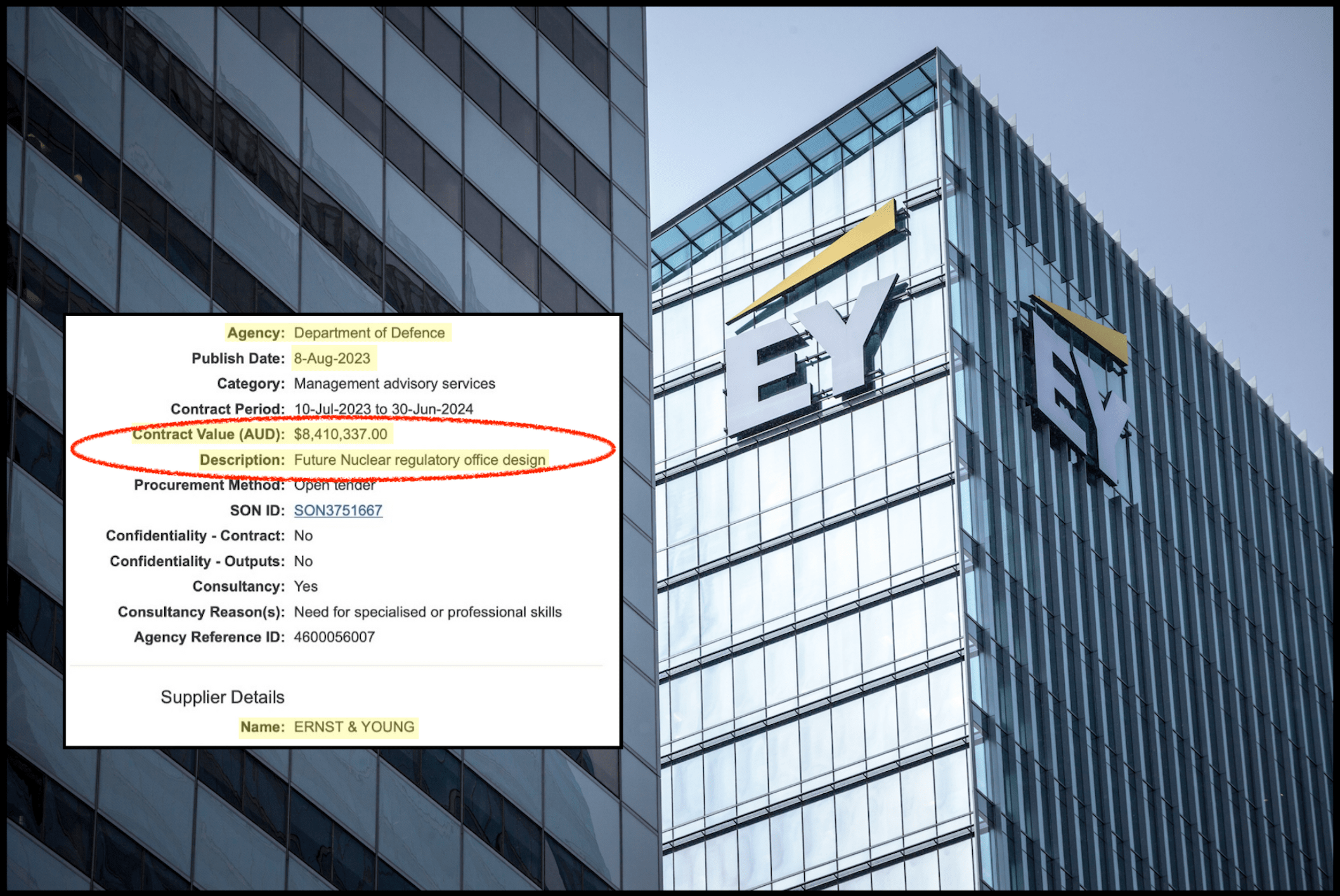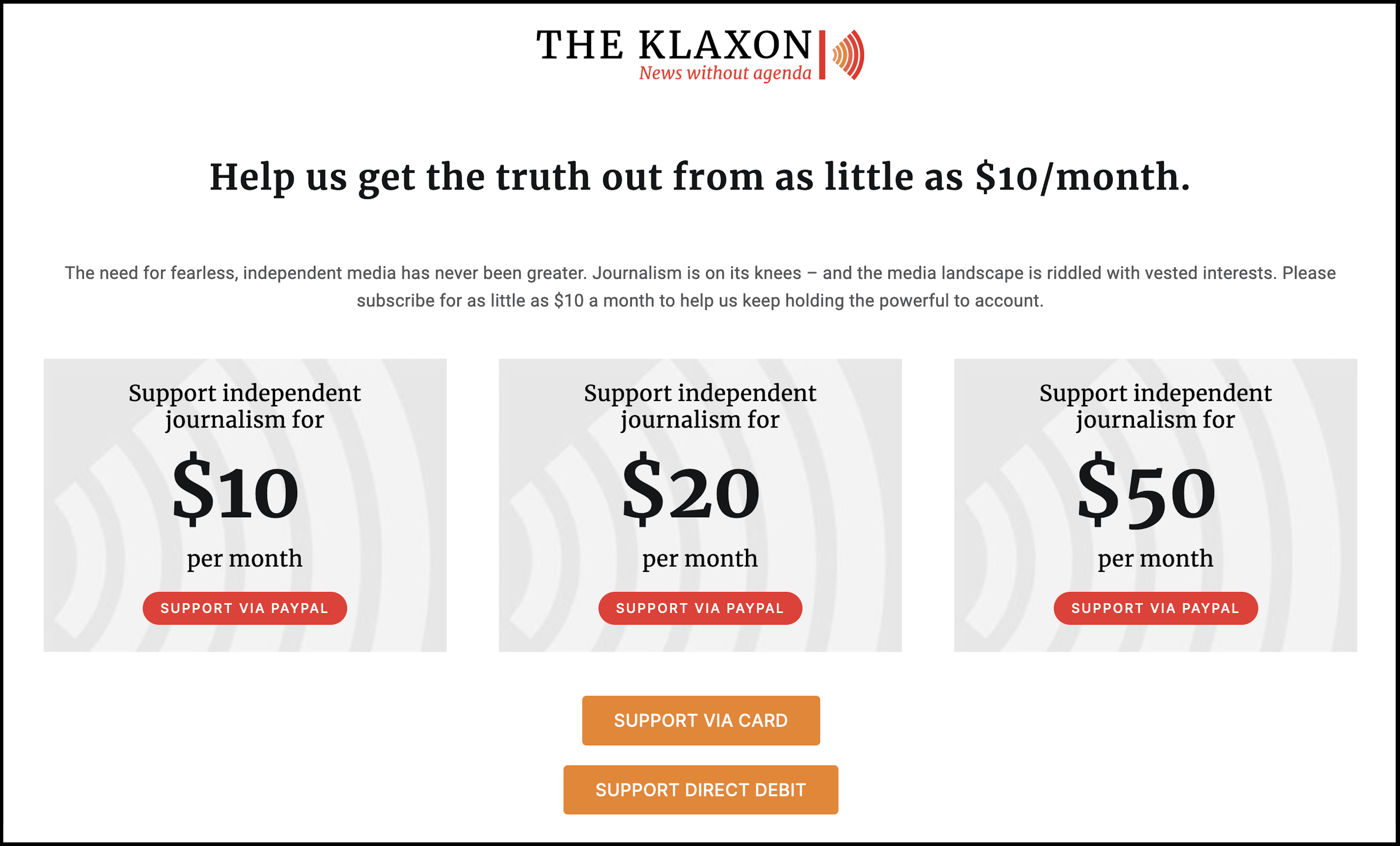Appreciate our quality journalism? Please subscribe here
The Australian Government has contracted “Big Four” accountancy and consulting firm EY for the “design” of a “future nuclear regulatory office”, at a cost of $8.4 million.
The Department of Defence started the contract, worth $8,410,337, on July 10 last month and it will run to June 30 next year, shows Federal Government tender site AusTender.
Published on August 8, it shows the contract is for “management advisory services” for “future nuclear regulatory office design”, but contains no further description.
Under the AUKUS security pact with the US and UK, announced in September 2021 under the previous Coalition Government, Australia plans to acquire a fleet of nuclear submarines, costing an estimated $268 billion to $368bn.
The plan has been a contentious issue for the Federal Labor Government, with some of its party members expressing strong opposition.
On Friday — over a month after the $8.4bn EY contract was signed — the Labor Party’s national conference heard from Labor members opposed to nuclear submarines.
Please DONATE HERE to help keep us afloat
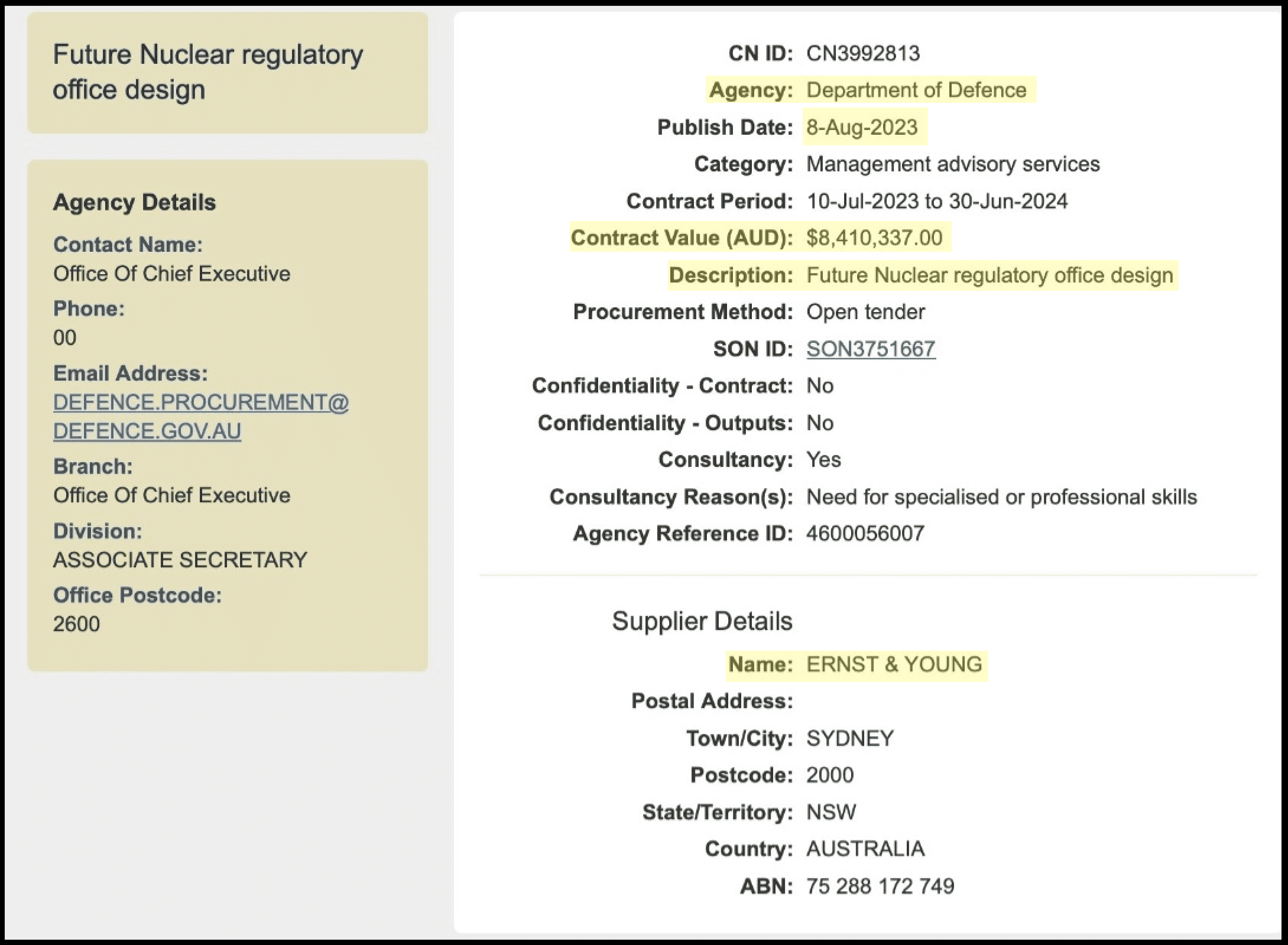
EY given $8.41m for “future nuclear regulatory office design”. Source: AusTender
Prime Minister Anthony Albanese, who fought off an attempt to have references to nuclear-powered submarines struck from Labor’s program, said he strongly backed the program.
“A partnership with two of Australia’s oldest friends…is consistent with the Labor values that I have been a part of my whole life,” Albanese said Friday.
The Department of Defence, and Defence Minister Richard Marles, did not respond to a series of questions The Klaxon put to each over a week ago, on August 11.
We sought information about what the contract was specifically for, and why it had been outsourced to private company EY – given Australian Government departments and agencies have been designing and creating “regulatory agencies” since Federation.
Australia has had nuclear technology, for medical and research purposes (not for power generation or weapons) since the 1950’s and regulatory body the Australian Nuclear Science and Technology Organisation (ANSTO) has been in place for 70 years (initially as the Australian Atomic Energy Commission).
“ANSTO is one of Australia’s largest public research organisations and is widely recognised as an international player in the field of nuclear science and technology.” its website states.
“It has a mandated role to advise the Australian Government on all nuclear and science technology matters.”
“ANSTO has a mandated role to advise the Australian Government on all nuclear and science technology matters”
The ANSTO is regulated by the Federal Government’s Australian Radiation Protection and Nuclear Safety Agency (ARPANSA) and the Australian Safeguards and Non-Proliferation Office (ASNO).
In 2019 outgoing Coalition Defence Minister Christopher Pyne joined EY immediately after leaving office, in a rolling scandal that sparked a Senate inquiry and calls for tighter rules on “revolving doors” between government and industry.
It was revealed Pyne held discussions with EY while still the Defence Minister, and had been offered the job weeks before the 2019 Federal election.
Please DONATE HERE to help keep us afloat
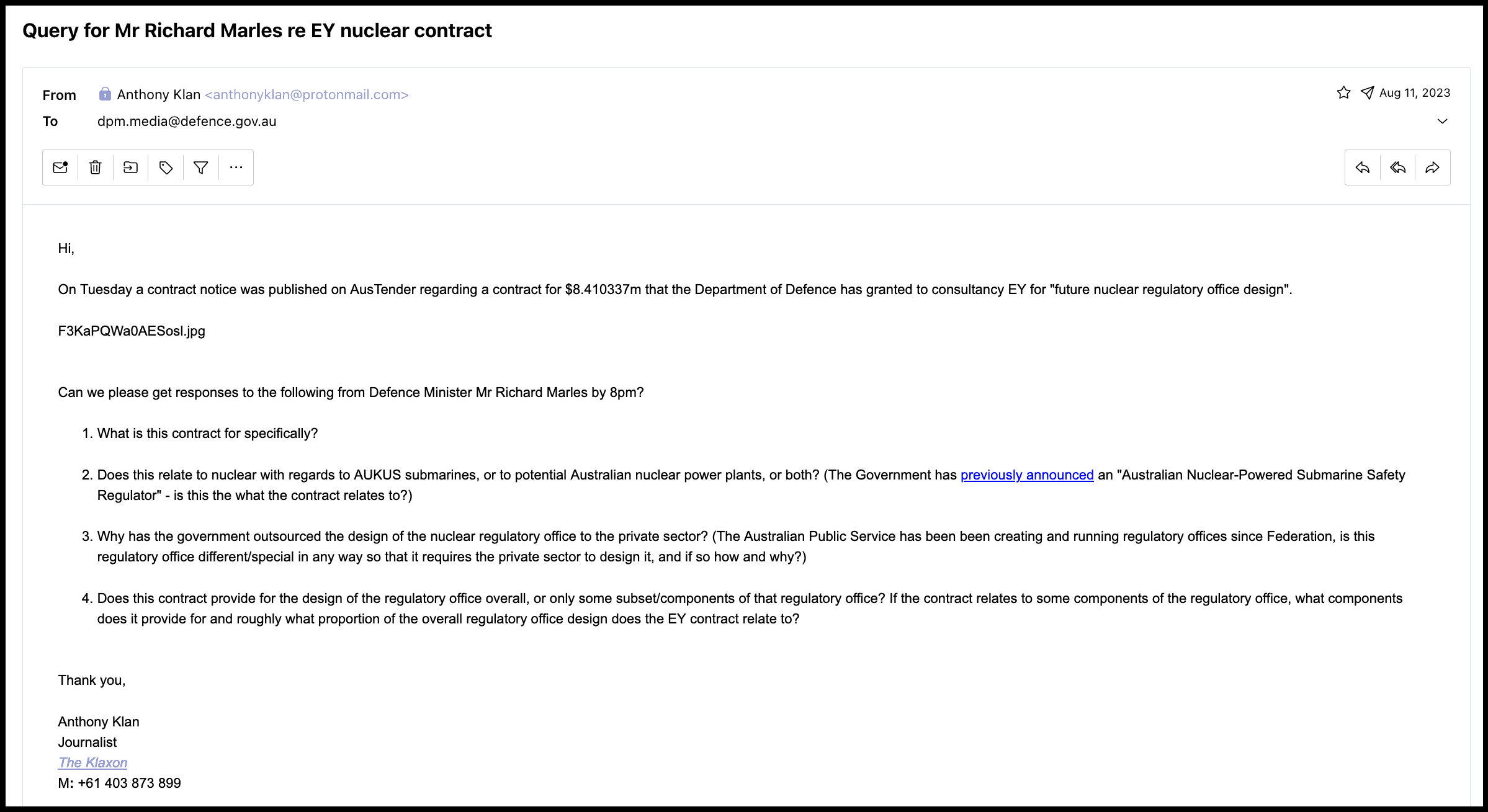
Unanswered: questions put to Defence Minister Riachard Marles on August 11.
Serious concerns have been raised about the Big Four consultancies — PwC, Deloitte, EY and KPMG — and their extensive infiltration of the Australian Government over the past decade.
The billions of dollars a year the firms are now charging Australian taxpayers — for work previously done by public servants, often at much lower cost — was thrust into the spotlight by the PwC tax scandal.
PwC was caught stealing top secret government information it gleaned while providing “advice” on new laws to stop multinationals avoiding Australian tax — which it sold for millions to multinationals seeking to avoid Australian tax.
Not one person has been jailed — or even received a fine — over the affair, despite authorities having known about it since at least 2016, and the scandal emerging in January.
In recent months there have been widespread reports of the Big Four engaging in confidentiality breaches, fee gouging and, in some cases, allegedly falsifying government invoices.
The new “shadow public service” dominated by the Big Four has raised serious national security concerns.
“The new “shadow public service” dominated by the Big Four has raised serious national security concerns”
Private companies do not face the same stringent codes of conduct such as the Public Governance, Performance and Accountability Act (PGPA Act).
They are also generally not subject to senate committees, which are a last stop for catching corruption when other government mechanisms fail, and have helped expose the extent of the PwC scandal.
The use of consultancies exploded under the Coalition Government, which placed “caps” on public servant numbers, seriously eroding capabilities, while simultaneously vastly increasing its spend on private contractors.
The Albanese Government has said it will cut expenditure on consultants by $3 billion over four years, but AusTender filings show it is continuing to hand over hundreds of millions of dollars of contracts.
Regardless, $3bn, or $750m a year, is a fraction of the spend — with the Federal Government spending almost $21 billion on contractors in the year to June 2021.
“The proposed cuts of $750m a year are a fraction of the almost $21 billion being spent”
Experts say vast waste in the area is preventing money being spent in other areas, worsening the nation’s financial position, and adding to cost of living pressures.
Many security experts have backed the acquisition of nuclear submarines to replace Australia’s aging fleet, but concerns have been raised over an extreme lack of transparency by Defence, which is accused of vast waste, including through exorbitant and opaque contracts with the Big Four.
Defence is accused of using “security” as an excuse for expenditure secrecy, when those grounds are often not justified, with the approach instead serving to prevent accountability and waste prevention.
Former Australian Senator Rex Patrick, who is also a former submariner, has been fighting the Department of Defence over transparency failings.
Please DONATE HERE to help keep us afloat
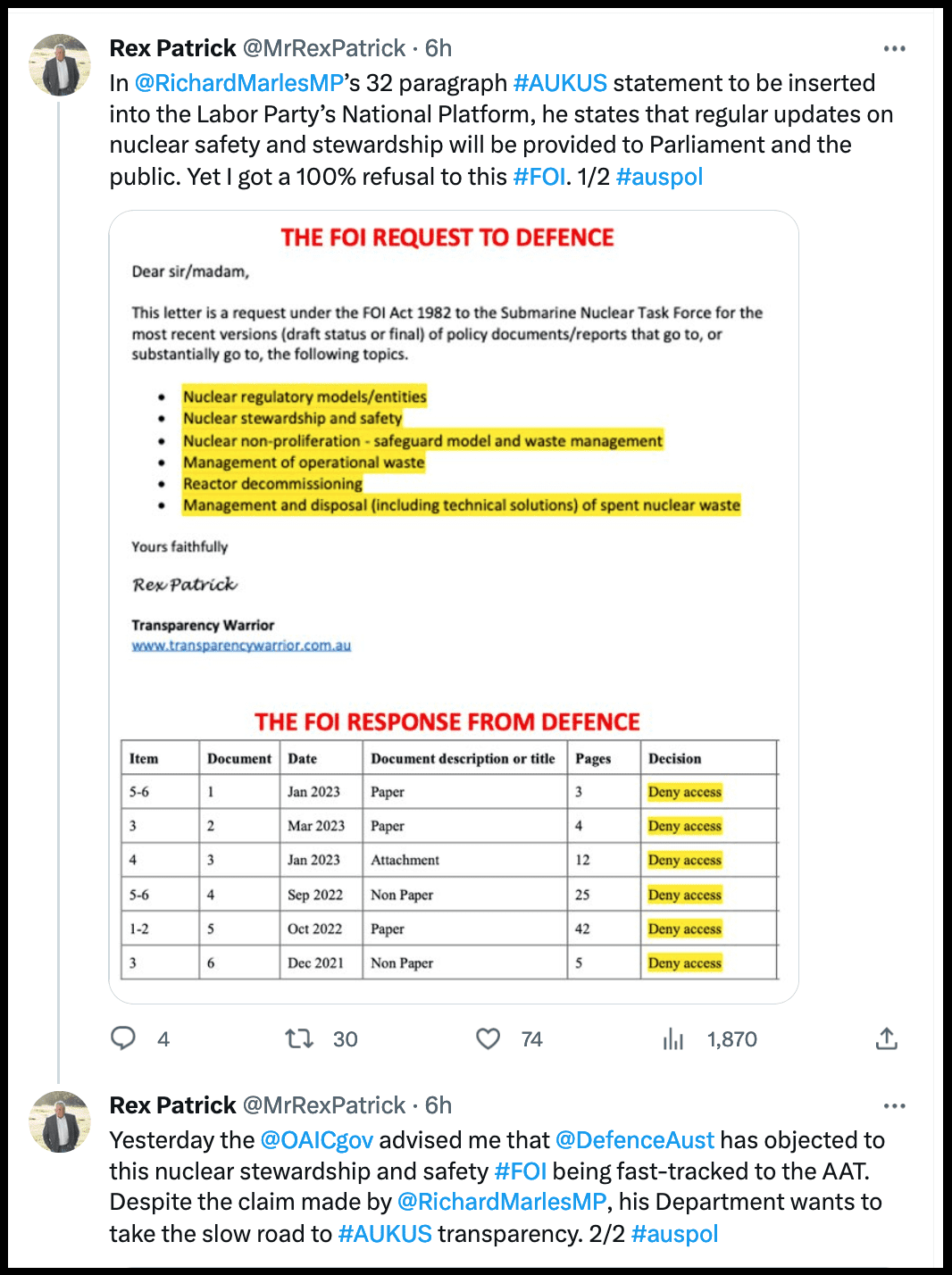
“Deny access”, Defence refuses all of Patrick’s requests under freedom of information laws. Source: Rex Patrick
On Saturday Patrick said claims from Defence Minister and Deputy Prime Minister Marles that parliament and the public would be given “regular updates on nuclear safety and stewardship” did not match with reality.
A freedom of information request he filed with Defence for information on “nuclear regulatory models”, “nuclear stewardship and safety”, “nuclear non-proliferation”, “management of operational waste”, “reactor decommissioning” and “management disposal” had all been rejected entirely, each one marked “deny access”.
“In Richard Marles’ 32 paragraph AUKUS statement to be inserted in the Labor Party’s National Platform, he states that regular updates on nuclear safety and stewardship will be provided to parliament and the public,” Patrick said.
“Yet I got this”, he said posting a copy of the blanket refusal from Defence.
He said he had been told Friday that Defence had also objected to his request that its rejection of his “nuclear stewardship and safety” freedom of information request to be “fast tracked” to the Administrative Appeals Tribunal (AAT).
“Despite the claim made by Richard Marles, his Department wants to take the slow road to AUKUS transparency,” he said.
BEFORE YOU GO! Help us stay afloat and telling these stories. Please SUBSCRIBE HERE or support us by making a DONATION. Thank you!
BEFORE YOU GO! Help us stay afloat and telling these stories. Please SUBSCRIBE HERE or support us by making a DONATION. Thank you!
Anthony Klan
Editor, The Klaxon
Help us get the truth out from as little as $10/month.
Unleash the excitement of playing your favorite casino games from the comfort of your own home or on the go. With real money online casinos in South Africa, the possibilities are endless. Whether you’re into classic slots, progressive jackpots, or live dealer games, you’ll find it all at your fingertips. Join the millions of players enjoying the thrill of real money gambling and see if today is your lucky day!
The need for fearless, independent media has never been greater. Journalism is on its knees – and the media landscape is riddled with vested interests. Please consider subscribing for as little as $10 a month to help us keep holding the powerful to account.


